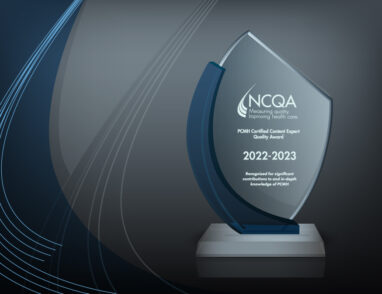Still Have Recognition Redesign Questions? We’ve Got Answers.
March 4, 2016 · Matt Brock
So you watched the full Recognition Redesign Google Hangout and our host, Dr. Michael Barr, and our guests never quite got to your question. No worries. We answer some of the hundreds of questions submitted below. Check them out and follow blog.ncqa.org for more answers in the future.
Is NCQA making changes to stay relevant or making changes that must be made? I believe the current PCMH program is having an impact. Why redesign something that is working?
Your feedback drives these changes. They directly respond to the thoughts and suggestions made by practices. At the same time, NCQA considered literature review and our own principle of continuous improvement.
We know the redesign is ambitious. Still, we want to make the recognition process less cumbersome for you. The redesigned program will require less documentation and will focus on core requirements. Virtual reviews will allow practices to demonstrate their work as they progress and data submission will be automated, where possible. Practices will be able to use much of the reporting they do already.
What barriers or challenges (identified by providers, payors and so on) motivated Recognition Redesign?
We were told the current process:
- Proves too difficult for small practices.
- Focuses on process instead of performance.
- Requires too much documentation.
- Provides too little contact with a real person at NCQA.
- Neglects opportunities for data acquisition.
- Allows momentum to decline within the practice during the lengthy three year period before renewal.
- Generates uncertainty that all practices are accomplishing what they claim.
- Fails to inform practices of their submission’s status or need for revisions in a timely manner.
- Provides too little education and guidance.
- Requires the use of two separate, complicated tools.
How will the recognition program change, fundamentally? Will there be different measures, different documentation requirements, a different application process?
The application and recognition process will merge on a new software platform that allows practices, consultants and NCQA to communicate. Reviews will take place through virtual review “check-ins” that will continue throughout the recognition process.
NCQA anticipates that practices seeking recognition for the first time will progress through about three check-ins. After they earn recognition, practices will report annually to confirm that they continue to meet requirements.
How will the burden of documentation change?
A focus of our redesign is to both reduce required documentation and make it easier for practices to share documentation. We plan to introduce virtual reviews through desktop sharing for practices going through recognition for the first time. The online platform will be more intuitive and will let practices associate documents with more than one element or factor at once.
Will there be any addition or change to PCMH 2014 standards for the new annual recognition submission?
NCQA will base submissions through 2017 on PCMH 2014 standards. We expect annual reporting will allow NCQA to introduce new requirements when necessary to sustain recognition. NCQA will notify practices of any new reporting requirements during an anticipated six to 12 month notification window.
Will the standards/elements change significantly? Will changes be streamlined with MU updates, payer programs and PQRS?
The redesign concentrates on the process of becoming recognized, as opposed to focusing on the standards and elements. That said, NCQA is considering streamlining standards and elements in PCMH 2017.
The idea behind “must-pass” elements and Critical Factors has been to help practices focus on processes that must be implemented for PCMH recognition. Understanding that most clinicians do not leave any requirement as “optional,” we drafted the redesign to focus on a core set of requirements for earning recognition, providing a path for practices to receive credit for advanced capabilities.
When will the new standards go into effect? Will we continue using PCMH 2014?
Practices currently submitting surveys for recognition will use the PCMH 2014 standards until PCMH 2017 is released in March 2017. Public comment on proposed requirements will be announced this summer.
There will be an overlap in 2017 while practices become familiar with new requirements. We will retire the PCMH 2014 standards at the end of 2017.
If a practice is in the process of pursuing PCMH 2014 Standard Recognition, would you suggest holding off until the new redesign is released?
No! Practices that achieve recognition on PCMH 2014 standards have the choice of a three-year recognition and then moving to the annual reporting process in order to sustain it, or opting for an earlier transition to the new annual reporting process.
Will the standards chosen for documentation and reporting change every year? How far in advance will practices be notified about information they must submit?
We expect annual reporting will allow NCQA to introduce new requirements when deemed important to sustain recognition. Annual reporting updates should be available for sustaining practices within an anticipated six to 12 month notification window.
Will NCQA require yearly submission of Quality data and if yes, what mechanism will NCQA employ for 2017? How about a data feed rather than a document upload?
NCQA expects to introduce an optional path for practices to report electronic clinical quality measures directly or through a third party (e.g., EHR vendor, health information exchange, qualified clinical data registry) in 2017.
Are NCQA metrics aligned with CMS, AHIP and NQF Core Quality measures?
NCQA has identified a set of 35 measures that come from the CMS Meaningful Use program. A collaborative led by AHIP recently identified 22 PCMH/ACO measures. Thirteen of those measures are in the NCQA set. The nine that are not in the NCQA set have not been specified electronically, are for health plans, or are survey measures.
How does NCQA plan to support and promote the use of CCEs in practices?
NCQA’s new process and platform will encompass CCEs. CCEs will be able to monitor, review and assist practices throughout the transformation and recognition process.
Is there a knowledge base for sharing best practices among groups that have achieved or are seeking PCMH recognition?
Yes. Both our education programs and our community of CCEs are available to share their expertise on NCQA’s new education platform, Strategies for Success as a PCMH*.
NCQA hosts periodic Webinars, live seminars and CCE training. Start here for that. We can’t recommend PCMH Congress enough. It is a spectacular resource for learning about others experiences and advice for best practices.
*Go to my.NCQA.org. Create an account (if you don’t have one already) and on the “MyApps” page, select the program.
What qualifiers will NCQA use to determine if the redesign is successful?
The redesign pilot programs were a good test of the new logistics and features, even though NCQA did not yet have the benefit of the new platform or a collection of clinical quality measures. After the redesigned process is released, we will collect data from early adopters to assess whether we are achieving our expected results.
Has the pricing schedule been determined?
We know pricing is always a concern for practices, so we take it seriously. Pricing is currently under development. Before it is finalized, we will conduct market research and talk directly to practices (large and small). We will balance those results along with the value this redesign generates. We can tell you our pilot practices’ results—as compared to the current process—demonstrate significant value in terms of reducing the time, people and resources they needed to achieve or sustain recognition.
For emerging primary care models, what has NCQA learned from PCMH that can inform future efforts?
From PCMH, we learned the need for ongoing quality improvement that focuses on all aspects of a highly functioning practice; the value of enhanced access; team-based care; population management; the importance of tracking and coordinating care; and well as patient-centered care management.








